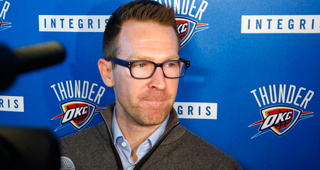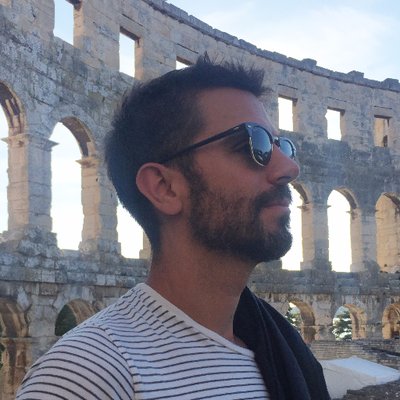The Oklahoma City Thunder had a choice to make in 2012 between James Harden and Serge Ibaka when both were eligible for contract extensions and they had already signed Kevin Durant and Russell Westbrook to max deals. Ibaka was amenable to a team-friendly deal and filled a more unique role than Harden with his interior defense and ability to function on offense without the ball and the rest is one of the most talked about trades in NBA history.
Four years later, as they enter the most important offseason in franchise history, the Thunder had a similar decision with Ibaka, Steven Adams and Enes Kanter. The Thunder committed to Kanter a year ago when they matched the four-year, $70 million offer sheet he signed with the Blazers and the value of Adams became clear in the playoffs. Ibaka had just one season left on his deal but he still had value and the Thunder traded him in for depth in a strikingly similar formula as the Harden trade sending him to the Orlando Magic for Victor Oladipo, Ersan Ilyasova and the draft rights to Domantas Sabonis.
The Thunder had hoped Ibaka would be a close third option for the Thunder with his rare blend of defense and perimeter shooting. Ibaka emerged as an elite shot blocker in 2012 when the Thunder went to The Finals and he then developed his three-pointer over the past four seasons with increasing volume. Ibaka gave the Thunder space at whatever big position he was playing, which was always critical whether Steven Adams, Kendrick Perkins or Andre Roberson was on the floor as well.
Ibaka plateaued in his development and actually regressed this past season, but he played well in the playoffs and even held up switching onto Stephen Curry. Ibaka’s defense was always key against the Spurs and they probably go to The Finals in 2014 if he’s healthy. Ibaka seemed to also grow weary of his specific role in a Durant and Westbrook centered universe. Trading Ibaka is still a risk because he’s such a rare talent and his prime aligns with Durant and Westbrook.
The acquisition of Oladipo means they will let Dion Waiters go in free agency. With the cap increasing, the market for Waiters is expected to get out of what the Thunder could afford given his purely supplementary role, and Oladipo provides a more consistent defensive presence and ballhandling. Oladipo has had an awkward initial three seasons with the Magic and his change of scenery playing with Durant and Westbrook could allow him to emerge as the kind of talent many projected him to be in 2013 when he went No. 2 and the Thunder tried to trade up to select him.
Oladipo’s shooting numbers will be especially interesting to watch because he’ll of course get open looks and he shot it at better than 40 percent from the corner this past season. Oladipo also has the ability to put the ball on the deck against a good close out and this will allow the Thunder to force the defense into multiple rotations and get even better quality looks than just a tough Durant/Westbrook creation off the dribble or an open 3.
Ilyasova is a stretch-4 in the 2010 version of the term. Ilyasova will hit about 40 percent of his open catch-and-shoot three’s and can take second unit minutes to give the Thunder some scoring. Ilyasova could also be waived to save Oklahoma City $8 million, but they appear to be trading for him to keep him.
Sabonis is agile but doesn’t have a ton of length or explosion and will need to really become a much more skilled version of his current self to become even a rotation player. The Thunder have leaned heavily on their D-League program and it would make sense if he takes the Mitch McGary role assuming he graduates to actually receiving NBA minutes.
This is ultimately a risky move for the Thunder who were impossibly close to a place in The Finals. The Thunder could have preserved the status quo, see what happens with Durant in free agency and then make their offseason moves in the middle of July when they could have dealt Ibaka into a team’s cap space. But the Thunder have always operated from a proactive standpoint and they didn’t have enough depth against the Warriors and they wore down late in many games, an issue that plagued them all season.
Oklahoma City's obvious late-game lineup will now be Westbrook, Oladipo, Andre Roberson, Durant and Adams since Billy Donovan. The Thunder always had the most upside with Durant at power forward and now Donovan will use that look by necessity.
The market for Ibaka was nowhere near where it was earlier on in his contract when he was under team control for multiple years at well below his actual value. The real evidence of that is in Sam Presti trading him within the family, agreeing to a deal with his former assistant GM Rob Hennigan.
Grade for Thunder: B
The Magic cleared cap space for this offseason and instead of taking their chances on letting free agents come to them, they turned some of their excess depth into a proven big in Ibaka. The Magic backdoor their way into some much needed floor spacing with Ibaka at either big positions. With Nikola Vucevic and Aaron Gordon as Ibaka’s frontcourt mates, Ibaka fits perfectly and allows the Magic to play a number of different ways while being the constant.
Ibaka is nowhere near as good as someone like Al Horford but he’s also cheaper this year and will allow Orlando to focus elsewhere in free agency. Ibaka is in his walk year and that’s where the real risk comes in for Orlando, a team that’s in-between rebuilding and competing for a playoff spot, in giving up a lottery pick and a recent second overall pick for him.
With Oladipo traded away, the Magic are now much more likely to re-sign Evan Fournier who has been a better fit with the rest of their core.
Grade for Magic: A-



